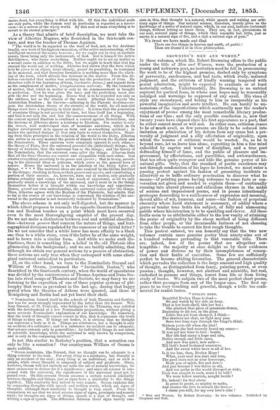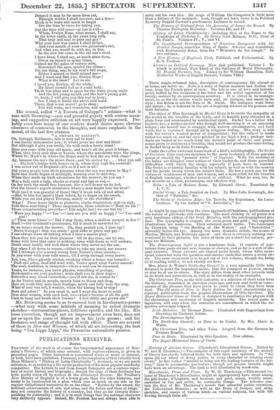BROWNING'S HEN AND WOMEN. * IF these volumes, which Mr. Robert
Browning offers to the public under the title of Men and Women, were the production of a young and unknown poet, no hesitation need be felt in pronouncing the work to be of the highest promise, dashed only by symptoms of perversity, carelessness, and bad taste, which study, matured judgment, and the criticism of kindly warning tempered with genial admiration, might be expected to eradicate or at least materially soften. Unfortunately, Mr. Browning is no untried aspirant for poetical fame in whose case hopes may be reasonably indulged and warnings be supposed of any avail. His vices of style are stereotyped, and belong to him as inseparably as his powerful imagination and acute intellect. He can hardly be un- conscious of the imperfections which continually mar the reader's enjoyment of poems among the most remarkable literary produc- tions of our time; and the only possible conclusion is, now that twenty years have elapsed since his first appearance as a poet, that he either cannot mend or will not. In either ease, criticism ceases to be of much avail, as few persons are likely to be seduced into imitation or admiration of his defects from any cause but a per- versity of judgment and a silly affectation of originality, upon which the lessons of criticism would be wasted. So, as he is beyond cure, let us leave him alone regretting in him a fine mind enfeebled by caprice and want of discipline, and a true poet im-
provement, himself of fame, and the public of pleasure and by affectations, and pnerilities, and awkwardnesses,
that too often quite overgrow and hide the genuine power of his natural gifts. Only, that the standard of poetic excellence may not through condonation of his lapse be lowered, we must enter a passing protest against his fashion of presenting incidents so allusively as to baffle ordinary penetration to discover what he means—of printing poems having reference to some facts or con- versation not given and needed to explain them—of continually running into absurd phrases and ridiculous rhymes in the midst of serious and impassioned poems, and in poems intentionally grotesque descending to a recklessness of expression and meaning, devoid alike of wit, humour, and sense—his fashion of perpetual obscurity where lucid statement is necessary, of oddity where a grave or tender tone befits his subject, of folly and unmeaning gabble where his intention is to be sparkling and clever. All these faults seem to us attributable either to the low vanity of attaining the praise of originality by the cheap method of being different from other people, or the inexcusable laziness of not choosing to take the trouble to correct his first rough thoughts.
This protest entered, we can honestly say that the two new volumes contain more genuine poetry than ninety-nine out of a hundred volumes pretending to that venerable title. There are, indeed, few of the poems that are altogether con- temptible: the majority at once delight us by their evidences of power and distress us by their incompleteness of concep- tion and their faults of execution. Some few are sufficiently perfect to become abiding favourites. The general characteristic which pervades the collection is the large amount and high quality of thought, as distinguished from fancy, painting-power, or even passion; thought, however not abstract and scientific, but real, embodied in persons and things, learnt from life or from living study of books. We subjoin two of the most perfect short poems, rather than passages from any of the longer ones. The first ap- pears to us very touching and graceful, though a trifle too senti- mental for realist tastes.
" EVELYN HOPE.
Beautiful Evelyn Hope is dead—
Sit and watch by her side an hour. That is her book-shelf, this her bed ; She plucked that piece of geranium-flower, Beginning to die too, in the glass.
Little has yet been changed, I think—
The shutters are shut, no light may pass Save two long rays through the hinge's chink.
Sixteen years old when she died!
Perhaps she had scarcely heard my name—
It was not her time to love : beside,
Her life had many a hope and aim,
Duties enough and little cares,
And now was quiet, now astir—
Till God's hand beckoned unawares, And the sweet white brow is all of her.
Is it too late, then, Evelyn Hope ?
What, your soul was pure and true, The good stars met in your horoscope, Made you of spirit, fire and dew— And just because I was thrice as old, And our paths in the world diverged so wide, Each was nought to each, must I be told ?
We were fellow mortals, nought beside ?
No, indeed ! for God above Is great to grant, as mighty to make, And creates the love to reward the love,— I claim you still, for my own love's sake !
• Men and Women. By Robert Browning. In two volumes. Published by Chapman and Hall.
Delayed it may be for more lives yet,
Through worlds I shall traverse, not a few—
Much is to learn and much to forget Ere the time be come for taking you.
But the time will come—at last it will—
When, Evelyn Hope, what meant, I shall say, In the lower earth, in the years long still, That body and soul so pure and gay ? Why your hair was amber I shall divine, And your mouth of your own geranium's red, And what you would do with me, in fine, In the new life come in the old one's stead.
I have lived, I shall say, so much since then, Given up myself so many times, Gained use the gains of various men, Ransacked the ages, spoiled the climes ; Yet one thing, one, in my soul's full scope,
Either I missed or itself missed me—
And I want and find you Evelyn Hope ! What is the issue ? Let us see.
I loved you, Evelyn, all the while ; My heart seemed full as it could hold ; There was place and to spare for the frank young smile And the red young mouth and the hair's young gold.
So, hush, I will give you this leaf to keep;
See, I shut it inside the sweet cold hand. There, that is our secret! go to sleep ; You will wake, and remember, and understand."
The second, called "A Toccata of Galuppi's " attains—what is rare with Browning—ease and graceful gayety with serious mean- ing, and suggestive criticism on art very happily expressed. Pro- bably even here many of our readers would desire more obvious closeness of connexion in the thoughts, and more emphasis in the moral, of the last five stanzas.
"A TOCCATA OF GALDTPI'S.
Oh, Galuppi, Baldassare, this is very sad to find ! I can hardly misconceive you ; it would prove me deaf and blind : But although I give you credit, 'de with such a heavy mind !
Here you come with your old music, and here's all the good it brings. What, they lived once thus at Venice, where the merchants were the kings, Where St. Mark's is, where the Doges used to wed the sea with rings ?
Ay, because the sea's the street there ; and 'tis arched by . . . what you call . . . Shylock's bridge with houses on it, where they kept the carnival!
I was never out of England—it's as if I saw it all !
Did young people take their pleasure when the sea was warm in May ?
Balla and masks begun at midnight, burning ever to mid-day,
When they made up fresh adventures for the morrow, do you say ?
Was a lady such a lady, cheeks so round and lips so red,—
On her neck the small face buoyant, like a bell-flower on its bed, O'er the breast's superb abundance where a man might base his head ?
Well (and it was graceful of them) they'd break talk off and afford —She, to bite her mask's black velvet, he to finger on his sword, While you sat and played Toccatas, stately at the clavichord !
What ? Those lesser thirds so plaintive, sixths diminished, sigh on sigh, Told them something ? Those suspensions, those solutions= Must we die ? ' Those commiserating sevenths= Life might last ! we can but try !'
Were you happy?'—' Yea And are you still as happy?'—' Yes—and you ? '
—‘ Then more kisses Did /stop them, when a million seemed so few ?' Hark !—the dominant's persistence, till it must be answered to !
So an octave struck the answer. Oh, they praised you, I dare say!
Brave Galuppi! that was music ! good alike at grave and gay ! I can always leave off talking when I hear a master play.'
Then they left you for their pleasure : till in due time, one by one, Some with lives that came to nothing, some with deeds as well undone, Death came tacitly and took them where they never see the sun.
But when I sit down to reason,—think to take my stand, nor swerve
Till I triumph o'er a secret wrung from Nature's close reserve,— In you come with your cold music, till I creep through every nerve.
Yes, you, like a ghostly cricket, creaking where a house was burned- ' Dust and ashes, dead and done with, Venice spent what Venice earned! The soul, doubtless, is immortal—where a soul can be discerned.
Yours, for instance, you know physics, something of geology, Mathematics are your pastime ; souls shall rise in their degree ; Butterflies may dread extinction,—you'll not die, it cannot be !
As for 'Venice and its people, merely born to bloom and drop, Here on earth they bore their fruitage, mirth and folly were the crop. What of soul was left, I wonder, when the kissing had to atop?
Dust and ashes!' So you creak it, and I want the heart to scold. Dear dead women, with such hair, too—what's become of all the gold Used to hang and brush their bosoms? I feel chilly and grown old."
Mr. Browning seems to us to succeed best in his character-poems —what may with some latitude of meaning be called dramatic sketches—conversation-pieces, fictitious epistles, and the like. His loose execution, though not an improvement even here, does not jar so upon the sense of fitness as in his lyric poems; and his freshness and range of thought tell with effect. There are several of these in Men and Women, of which all are interesting, the best being " Fra Lippo Lippi," the Florentine naturalistic painter.



































 Previous page
Previous page